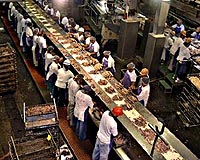 |
Gothenburg, germany (SPX) Oct 07, 2010 Having survived for more than 400 million years, the horseshoe crab is now under threat - primarily due to overharvest and habitat destruction. However, climatic changes may also play a role. Researchers from the University of Gothenburg reveal how sensitive horseshoe crab populations are to natural climate change in a study recently published in the scientific journal Molecular Ecology. The horseshoe crab is often regarded as a living fossil, in that it has survived almost unchanged in terms of body design and lifestyle for more than 400 million years. Crabs similar to today's horseshoe crabs were walking the Earth long before the dinosaurs. "Examining the genetic variation in populations of horseshoe crabs along the east coast of America has enabled us to track changes in population size over time," says Matthias Obst from the Department of Zoology at the University of Gothenburg, one of the authors of the study published in Molecular Ecology. "We noted a clear drop in the number of horseshoe crabs at the end of the Ice Age, a period characterised by significant global warming." Horseshoe crab important in the coastal food chain "Our results also show that future climate change may further reduce the already vastly diminished population. Normally, horseshoe crabs would have no problem coping with climate change, but the ongoing destruction of their habitats make them much more sensitive." Horseshoe crabs are an important part of the coastal food chain. Their blue blood is used to clinically detect toxins and bacteria. There are currently just four species of horseshoe crab left: one in North America (Limulus polyphemus) and three in South East Asia (Carcinoscorpius rotundicauda, Tachypleus gigas and Tachypleus tridentatus). All four species are under threat on account of over-harvesting for use as fish bait and in the pharmaceuticals industry. The destruction of habitats around the beaches that are the crabs' breeding grounds has also contributed to the drop in numbers. "The most decisive factor may be future changes in sea level and water temperature," says Obst. "Even if they are on a minimal scale such changes are likely to have a negative impact on the crabs' distribution and reproduction."
Share This Article With Planet Earth
Related Links University of Gothenburg Water News - Science, Technology and Politics
 Strong catch of tuna in Canada
Strong catch of tuna in CanadaCharlottetown, Prince Edward Island (UPI) Oct 5, 2010 A proposal to list bluefin tuna as an endangered species puzzles some Canadian fishermen who say they see signs of abundance in the start of the fishing season. They landed 144 tuna in the first eight hours of fishing Monday off Prince Edward Island and officials expect the remainder of the quota to be caught Tuesday, meaning Island fishermen will catch their quota in just two days, Can ... read more |
|
| The content herein, unless otherwise known to be public domain, are Copyright 1995-2010 - SpaceDaily. AFP and UPI Wire Stories are copyright Agence France-Presse and United Press International. ESA Portal Reports are copyright European Space Agency. All NASA sourced material is public domain. Additional copyrights may apply in whole or part to other bona fide parties. Advertising does not imply endorsement,agreement or approval of any opinions, statements or information provided by SpaceDaily on any Web page published or hosted by SpaceDaily. Privacy Statement |